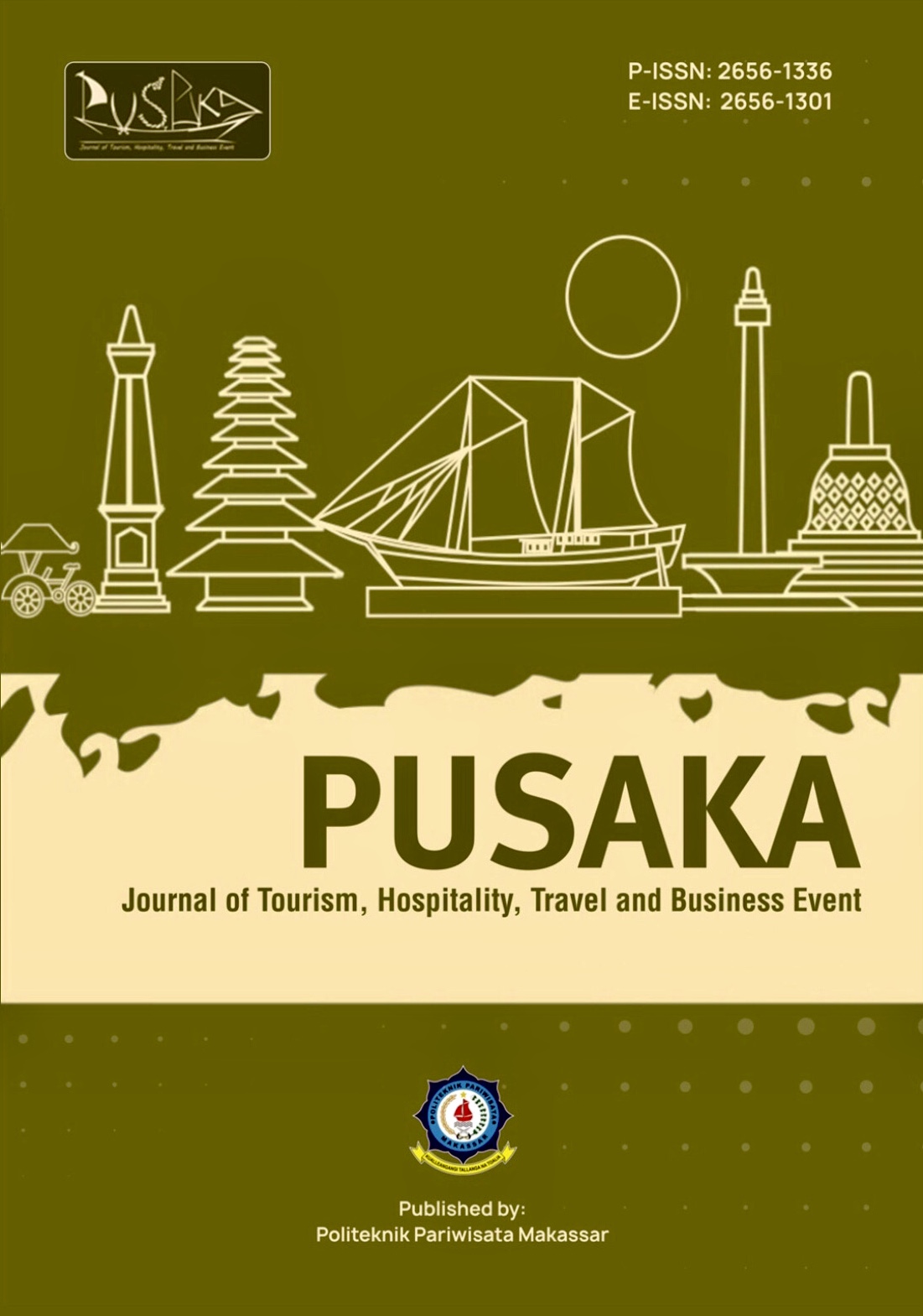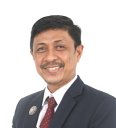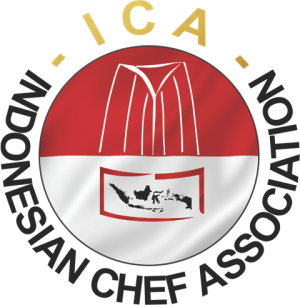Application of the Sad Kerthi Concept in Developing Marine Tourism Area on the Blue Economy in Karangasem Regency
DOI:
https://doi.org/10.33649/pusaka.v6i2.235Keywords:
Sad Kerthi, Blue Economy, Sustainable TourismAbstract
This study presents a problem statement by exploring the application of the Sad Kerthi concept in the development of a marine tourism area in Karangasem Regency, Bali, with a focus on blue economy principles. The Sad Kerthi, deeply rooted in Balinese Hindu local wisdom, emphasizes the preservation of six sacred elements: Atma (soul), Segara (ocean), Danu (lake), Wana (forest), Jagat (earth), and Jana (human). The challenge lies in applying the blue economy approach to optimize the sustainable and wise utilization of marine resources while maintaining ecosystem balance and enhancing local community welfare. By aligning with Blue Economy principles, which advocate for the sustainable use of ocean resources for economic growth, the study underscores the potential of integrating traditional wisdom with modern economic models. The research indicates a methodology that utilizes a qualitative approach, conducting in-depth interviews with experts from governmental and cultural sectors, as well as academic and research programs that incorporate these values of local wisdom. The main findings indicate that local wisdom and the blue economy are interdependent, mutually strengthening each other in the quest for sustainable development. Local wisdom serves as a cornerstone for sustainable practices, cultural values, and community involvement, which can significantly enhance the effectiveness of the Blue Economy framework. The main conclusions of this research contribute to the discussion on sustainable tourism by illustrating the effectiveness of a culturally rooted approach to achieving both environmental and economic sustainability.
References
Abdullah, M. A., Arifin, A., & Tripa, S. (2018). Panglima Laot: his legacy and role in conserving marine resources in Aceh, Indonesia. In SHS web of conferences (Vol. 45, p. 06003). EDP Sciences.
Airawati, M. N., Fauzi, I., & Putranto, A. (2023). Potensi Penerapan Ekonomi Biru Dalam Mendukung Pariwisata Berkelanjutan di Wilayah Pesisir Daerah Istimewa Yogyakarta. Buletin Ilmiah Marina Sosial Ekonomi Kelautan dan Perikanan, 9(2), 133-149.
Alkhudri, A. T., Heriyanto, N., Zulfikar, F., & Nugroho, T. T. (2021, May). From Eco Marine Mart to Ecotourism: Development of Local Wisdom and Marine Creative Economy as Tourism Excellence. In 1st Annual International Conference on Natural and Social Science Education (ICNSSE 2020) (pp. 307-314). Atlantis Press.
Anggayana, I. A., Budasi, I. G., & Kusuma, I. W. (2019). Social Dialectology Study of Phonology in Knowing English Student Speaking Ability. (P. Robertson, Ed.) The Asian EFL Journal, 25(5.2), 225-244.
Anggayana, I. A., Suparwa, I. N., Dhanawaty, N. M., & Budasi, I. G. (2020). Lipang, Langkuru, Waisika Language Kinship: Lexicostatistics Study in Alor Island. International Journal of Psychosocial Rehabilitation, 24(4), 301-319.
Antara, I. M. K., Anggayana, I. W. A., Dwiyanti, N. M. C., & Sengkey, F. (2023). Identify Industrial Work Practices in the Food and Beverage Product Department of Kayumas Seminyak Resort. Jurnal Manajemen Pelayanan Hotel, 7(2), 1140-1151.
Auad, G., & Fath, B. D. (2022). Towards a flourishing blue economy: Identifying obstacles and pathways for its sustainable development. In Current Research in Environmental Sustainability (Vol. 4). Elsevier B.V. https://doi.org/10.1016/j.crsust.2022.100193
Budasi, I. G., & Anggayana, I. A. (2019). Developing English for Housekeeping Materials for Students of Sun Lingua College Singaraja-Bali. The Asian EFL Journal, 23(6.2), 164-179.
Budasi, I. G., Satyawati, M. S., & Anggayana, W. A. (2021). The status of Lexicon used in Tabuh Rah ritual in Menyali Village North Bali: An Ethnolinguistic study. Kasetsart Journal of Social Sciences, 42(4), 960-967.
Cisneros-Montemayor, A. M. (2019). A Blue Economy: equitable, sustainable, and viable development in the world’s oceans. In Predicting future oceans (pp. 395-404). Elsevier.
Cisneros-Montemayor, A. M., Croft, F., Issifu, I., Swartz, W., & Voyer, M. (2022). A primer on the “blue economy:” Promise, pitfalls, and pathways. One Earth, 5(9), 982-986.
E A Alqattan, M. (2024). The Kuwaiti blue economy and its potential obstacles. Heliyon, 10(10). https://doi.org/10.1016/j.heliyon.2024.e30975
Fahrurrozi, F. (2020). Analysis Concept of the Blue Economy Islamic Perspective (Case Studi Jumiang as Marine Tourism in Pamekasan). Perisai: Islamic Banking and Finance Journal, 4(1), 17-17.
Hampton, M. P., & Jeyacheya, J. (2020). Tourism-Dependent Small Islands, Inclusive Growth, and the Blue Economy. In One Earth (Vol. 2, Issue 1, pp. 8–10). Cell Press. https://doi.org/10.1016/j.oneear.2019.12.017
Hardaningrum, T. W., & Soetjipto, B. E. (2019). The Application of Blue Economy Principle Through Local Wisdom of Seaweed Farmers in Labuhan Kertasari Village, West Sumbawa Regency. In 2018 International Conference on Islamic Economics and Business (ICONIES 2018) (pp. 158-161). Atlantis Press.
Hasriyanti, H., Salam, N. P., & Sartina, S. (2021). Local wisdom in sustainable management of marine resources: A case study of coastal communities in bone regency. LaGeografia, 20(1), 77-83.
Jayakusuma, Z., Lestari, M. M., & Rasudin, N. (2023). Kearifan Lokal Masyarakat Pesisir Pantai yang Berpotensi Blue Economy dalam Rangka Pencapaian Sustainable Development Goals di Pulau Rupat Kabupaten Bengkalis. Riau Law Journal, 7(1), 114-134.
Kabil, M., Priatmoko, S., Magda, R., & Dávid, L. D. (2021). Blue economy and coastal tourism: A comprehensive visualization bibliometric analysis. Sustainability, 13(7), 3650.
Kurniawati, E., & Aliman, M. (2020). Community Based Tourism (Cbt) To Establish Blue Economy And Improve Public Welfare For Fishing Tourism Development In Klatak Beach, Tulungagung, Indonesia. Geojournal Of Tourism & Geosites, 31(3).
Lelloltery, H., Rumanta, M., & Kunda, R. M. (2021). Strategy for marine ecotourism development based on natural resource management: Case study in Kotania Bay, Western Seram District, Maluku, Indonesia. Nusantara Bioscience, 13(1).
Leposa, N. (2020). Problematic blue growth: A thematic synthesis of social sustainability problems related to growth in the marine and coastal tourism. Sustainability Science, 15, 1233-1244.
Mirta, I. W., Suryana, I. N. M., & Candranegara, I. M. W. (2023, April). Implementation of The Sad Kertih Concept in The Development of A Spiritual Tourism Area Based on Green Tourism in Nusa Penida District, Klungkung Regency. In WICSTH 2022: Proceedings of the 2nd Warmadewa International Conference on Science, Technology and Humanity, WICSTH 2022, 28-29 October 2022, Denpasar-Bali, Indonesia (p. 152). European Alliance for Innovation.
Muksin, M., Bustang., Sakdiyah, S L., Purwoko, D., Iskandar, R., & Karsiningsih, E. (2021). Design of Program Objective Structure in Marine Ecotourism Development. https://doi.org/10.2991/assehr.k.210101.030
Osin, R. F., Kusuma, I. R. W., & Suryawati, D. A. (2019). Strategi Pengembangan Objek Wisata Kampung Tradisional Bena Kabupaten Ngada-Flores Nusa Tenggara Timur (NTT). Jurnal Ekonomi dan Pariwisata, 14(1).
Osin, R. F., Pibriari, N. P. W., & Anggayana, I. W. A. (2019, August). Balinese Women in Spa Tourism in Badung Regency. In International Conference on Cultural Studies (Vol. 2, pp. 35-38).
Osin, R. F., Pibriari, N. P. W., & Anggayana, I. W. A. (2020). Memaksimalkan Pelayanan Wisata SPA di Kabupaten Badung dalam Usaha yang Dijalankan oleh Perempuan Bali. Jurnal Ekonomi dan Pariwisata, 15(1).
Osin, R. F., Purwaningsih, N. K., & Anggayana, I. W. A. (2021). The Model of Development Tourism Village Through the Involvement of Millennial Generation in Bali. International Journal of Multicultural and Multireligious Understanding, 8(1), 300-306.
Putra, I. M. M. D. A., & Anggayana, I. W. A. (2023). Identify Industrial Work Practices in the Food and Beverage Product Department of Quest Hotel Kuta. Jurnal Manajemen Pelayanan Hotel, 7(2), 1152-1162.
Putra, I. N. D. (2008). Modern performing arts as a reflection of changing Balinese identity. Indonesia and the Malay World, 36(104), 87–114. https://doi.org/10.1080/13639810802017842
Putra, I. N. D., & Hitchcock, M. (2005). Pura Besakih: A world heritage site contested. Indonesia and the Malay World, 33(96), 225–238. https://doi.org/10.1080/13639810500284116
Putra, I. N. D., & Jelantik, I. B. (2023). Literary Tourism: Maintaining Balinese Identity in “Host-Guest” Interaction in Short Stories by Balinese Writers. Mudra Jurnal Seni Budaya, 38(4), 420–431. https://doi.org/10.31091/mudra.v38i4.2471
Putra, I. N. D., Verheijen, B., Ardika, I. W., & Yanthy, P. S. (2021). Affinity tourism and exotic tourism in Bali. The Chinese and Indian tourist gaze in the Garuda Wisnu Kencana Park. Journal of Tourism and Cultural Change, 19(4), 427–443. https://doi.org/10.1080/14766825.2020.1797063
Redianis, N. L., Putra, A. A. B. M. A., & Anggayana, I. W. A. (2019, August). Effect of Culture on Balinese Language Used by Employee Hotels for Foreign Travelers in the Sociolinguistic Perspective. In International Conference on Cultural Studies (Vol. 2, pp. 39-43).
Sari, N. P. R. (2021) Employee Performance in Star Hotels in UBUD Tourism Area Bali. IOSR Journal of Humanities And Social Science (IOSR-JHSS, 26(8). https://doi.org/10.9790/0837-2608010414
Sengkey, F., Osin, R. F., & Anggayana, I. A. (2022, 12 31). Emotional Intelligence and Social Networking Effects on Student Academic Achievement. Jurnal Manajemen Pelayanan Hotel , 6(2), 532-538. http://dx.doi.org/10.37484/jmph.060221
Suarta, I. K., & Budiarta, I. P. (2019, October). Marketing Strategy of Marine Tourism in the Village of Serangan Denpasar. In International Conference On Applied Science and Technology 2019-Social Sciences Track (iCASTSS 2019) (pp. 176-180). Atlantis Press.
Suarthana, J. H. P., Osin, R. F., & Anggayana, I. W. A. (2020). Analisis Menu Serta Kaitannya dengan Strategi Bauran Pemasaran pada Loloan Restaurant Kuta-Bali. Jurnal Manajemen Pelayanan Hotel, 4(1), 12-18.
Subagiana, I. G. M., Suryaniadi, S. M., & Wijayati, N. L. M. (2019). Kajian Pengembangan Ekowisata Bahari Sebagai Mata Pencaharian Alternatif Bagi Masyarakat Tulamben dan Amed Kabupaten Karangasem Propinsi Bali. Jurnal Bisnis dan Kewirausahaan, 15(1), 58-64.
Sudiarta, I. N., & Karini, N. M. O. (2020). Analisis Dampak dan Daya Dukung Pariwisata Daya Tarik Wisata Tanah Lot di Kecamatan Kediri, Kabupaten Tabanan. Jurnal Ilmiah Hospitality Management, 10(2), 175-188
Sudiarta, I. N., & Suardana, I. W. (2016). Tourism Destination Planning Strategy: Analysis and Implementation of Marketing City Tour in Bali. Procedia - Social and Behavioral Sciences, 227, 664–670. https://doi.org/10.1016/j.sbspro.2016.06.130
Sudipa, I. N., Aryati, K. F., Susanta, I. P. A. E., & Anggayana, I. W. A. (2020). The development of syllabus and lesson plan based on English for occupational purposes. International Journal of Psychosocial Rehabilitation, 24(4), 290-300.
Suryawati, D. A., & Osin, R. F. (2019). Analisis Menu untuk Menentukan Strategi Bauran Pemasaran pada Bunut Café di Hotel White Rose Legian Kuta. Jurnal Manajemen Pelayanan Hotel, 3(1), 29-35.
Suryawati, D. A., Dewi, S. P. A. A. P., Osin, R. F., & Anggayana, I. W. A. (2022). The Role of Women in Protecting the Village and Rural Tourism in Timpag Village. Jurnal Manajemen Pelayanan Hotel, 5(2), 74-79.
Trégarot, E., Meissa, B., Gascuel, D., Sarr, O., El Valy, Y., Wagne, O. H., Kane & Failler, P. (2020). The role of marine protected areas in sustaining fisheries: The case of the National Park of Banc d’Arguin, Mauritania. Aquaculture and Fisheries, 5(5), 253-264.
Vázquez Pinillos, F. J., & Barragán Muñoz, J. M. (2024). Progress and challenges for the establishment of a sustainable blue economy in Chiloe (Chile): Exploring the connections of a socio-ecological system. Ocean and Coastal Management, 257. https://doi.org/10.1016/j.ocecoaman.2024.107323
Wiana, K. (2018). Sad Kertih: Sastra Agama, Filosofi, dan Aktualisasinya. Bali Membangun Bali, Jurnal Bappeda Litbang, 1, 159-179.
Winther, J., Dai, M., Rist, T., Hoel, A H., Li, Y., Trice, A., Morrissey, K., Juinio‐Meñez, M A., Fernandes, L., Unger, S., Scarano, F R., Halpin, P N., & Whitehouse, S. (2020). Integrated ocean management for a sustainable ocean economy. Nature Portfolio, 4(11), 1451-1458. https://doi.org/10.1038/s41559-020-1259-6
Yanti, N. K. K., & Anggayana, I. W. A. (2023). Identify Industrial Work Practices in the Food and Beverage Product Department of Grand Ixora Kuta Resort. Jurnal Manajemen Pelayanan Hotel, 7(1), 588-601.
Youssef, M. (2023). Blue Economy Literature Review. International Journal of Business and Management, 18(3), 1-12. https://doi.org/10.5539/ijbm.v18n3p12
Yuan, H., Choukroune, L., & Failler, P. (2024). Centring justice for labour in the new blue economy: Principles for applying emerging evidence and theoretical critiques to policy and practice. Marine Policy, 168. https://doi.org/10.1016/j.marpol.2024.106327
Downloads
Published
How to Cite
Issue
Section
License
Copyright (c) 2025 Rosvita Flaviana Osin, I Nyoman Darma Putra, I Nyoman Sudiarta, Ni Putu Ratna Sari

This work is licensed under a Creative Commons Attribution-ShareAlike 4.0 International License.






















